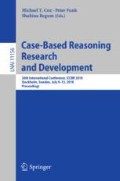Abstract
In any knowledge investigation by which a user must acquire new or missing information, situations often arise which lead to a fork in their investigation. Multiple possible lines of inquiry appear that the users must choose between. A choice of any one would delay the user’s ability to choose another, if the chosen path proves to be irrelevant and happens to yield only useless information. With limited knowledge or experience, a user must make assumptions which serve as justifications for their choice of a particular path of inquiry. Yet incorrect assumptions can lead the user to choose a path that ultimately leads to dead-end. These fruitless lines of inquiry can waste both time and resources by adding confusion and noise to the user’s investigation. Here we evaluate an algorithm called Tangent Recognition Anomaly Pruning to eliminate false starts that arise in interactive dialogues created within our case-based reasoning system called Ronin. Results show that Tangent Recognition Anomaly Pruning is an effective algorithm for processing mistakes when reusin case reuse.
Access this chapter
Tax calculation will be finalised at checkout
Purchases are for personal use only
References
Aamodt, A., Plaza, E.: Case-based reasoning: foundational issues, methodological variations, and system approaches. AI Commun. 7(1), 39–59 (1994)
Aha, D., Breslow, L., Muoz-Avila, H.: Conversational case-based reasoning. Appl. Intell. 14(1), 125 (1999)
Bengfort, B., Cox, M.: Interactive reasoning to solve knowledge goals. In: Aha, D.W. (ed.) Goal Reasoning: Papers from the ACS Workshop, GT-IRIM-CR-2015-001: 1025. Georgia Institute of Technology, Atlanta, GA, Institute for Robotics and Intelligent Machines, May 2015
Branting, K., Lester, J., Mott, B.: Dialogue management for conversational case-based reasoning. In: Funk, P., González Calero, P.A. (eds.) ECCBR 2004. LNCS (LNAI), vol. 3155, pp. 77–90. Springer, Heidelberg (2004). https://doi.org/10.1007/978-3-540-28631-8_7
De Mantaras, R.L., et al.: Retrieval, reuse, revision and retention in case-based reasoning. Knowl. Eng. Rev. 20(3), 215–240 (2005)
Dufour-Lussier, V., Le Ber, F., Lieber, J., Nauer, E.: Automatic case acquisition from texts for process-oriented case-based reasoning. Inf. Syst. 40, 153–167 (2014)
Eyorokon, V., Bengfort, B., Panjala, U., Cox, M.: Goal trajectories for knowledge investigations. In: Coman, A., Kapetanakis, S. (eds.) Twenty-Forth International Conference on Case-Based Reasoning Workshop Proceedings: Synergies between CBR and Knowledge Discovery, vol. 1815, pp. 202–211. Atlanta, Georgia (2016)
Eyorokon, V., Gogineni, B., Pratyusha, Y., Cox, M.: Case Retrieval Using Goal Similarity for Knowledge Investigations. Unpubl. Data (2018)
Gu, M., Aamodt, A.: Dialogue learning in conversational CBR. In: Proceedings of the Nineteenth International Florida Artificial Intelligence Research Society Conference, pp. 358–363, Melbourne Beach, Florida, January 2006
Higgins, D., Burstein, J., Attali, Y.: Identifying off-topic student essays without topic-specific training data. Nat. Lang. Eng. 12, 145 (2006). https://doi.org/10.1017/s1351324906004189
Huang, A., Milne, D., Frank, E., Witten, I.H.: Clustering documents using a wikipedia-based concept representation. In: Theeramunkong, T., Kijsirikul, B., Cercone, N., Ho, T.-B. (eds.) PAKDD 2009. LNCS (LNAI), vol. 5476, pp. 628–636. Springer, Heidelberg (2009). https://doi.org/10.1007/978-3-642-01307-2_62
Kiros, R., Zhu, Y., Salakhutdinov, R., Zemel, R., Torralba, A., Urtasun, R., Fidler, S.: Skip-thought vectors. arXiv preprint arXiv, 3, 4 (2015)
Kolodner, J.L.: Case-Based Reasoning, p. 1993. Morgan Kaufmann Publishers, San Mateo (1993)
Kryszkiewicz, M.: The cosine similarity in terms of the euclidean distance. In: Encyclopedia of Business Analytics and Optimization, pp. 2498–2508. https://doi.org/10.4018/978-1-4666-5202-6.ch223.
Li, Y., McLean, D., Bandar, Z., O’shea, J., Crockett, K.: Sentence similarity based on semantic nets and corpus statistics. IEEE Trans. Knowl. Data Eng. 18(8), 1138–1150 (2006)
Mikolov, T., Sutskever, I., Chen, K., Corrado, G., Dean, J.: Distributed representations of words and phrases and their compositionality (2013)
Ram, A., Hunter, L.: The use of explicit goals for knowledge to guide inference and learning. Appl. Intell. 2(1), 47–73 (1992)
Recio-Garcia, J.A. Diaz-Agudo, B., Gonzlez-Calero, P.A. Textual CBR in jCOLIBRI: from retrieval to reuse. In: Proceedings of the ICCBR 2007 Workshop on Textual Case-Based Reasoning: Beyond Retrieval, pp. 217–226 (2007)
Riesbeck, C.K., Schank, R.C. (eds.): Inside Case-Based Reasoning. Lawrence Erlbaum Associates, Hillsdale (1989)
Salton, G., Wong, A., Yang, C.: A vector space model for automatic indexing. Commun. ACM 18(11), 613–620 (1975)
Schumacher, P., Minor, M., Walter, K., Bergmann, R.: Extraction of procedural knowledge from the web. In: Workshop Proceedings, WWW 2012, Lyon, France (2012)
Singhal, A.: Modern information retrieval: a brief overview. IEEE Data Eng. Bull. 24(4), 35–43 (2001)
Stewart, R, Danyluk, A, Liu, Y.: Off-topic detection in conversational telephone speech. In: Proceedings of the HLT-NAACL 2006 Workshop on Analyzing Conversations in Text and Speech, ACTS 09 (2006). https://doi.org/10.3115/1564535.1564537
Weber, R., Martins, A., Barcia, R.: On legal texts and cases. In: Textual Case-Based Reasoning: Papers from the AAAI 1998 Workshop, pp. 40–50 (1998)
Weber, R.O., Ashley, K.D., Brninghaus, S.: Textual case-based reasoning. Knowl. Eng. Rev. 20(3), 255–260 (2005)
Zellig, H.: Distributional structure. Word 10(2–3), 146–162 (1954)
Acknowledgments
This material is based on research sponsored by the Air Force Research Laboratory, under agreement number FA8650-16-C-6763. This research was also supported by ONR grant N00014-18-1-2009. The U.S. Government is authorized to reproduce and distribute reprints for Governmental purposes notwithstanding any copyright notation thereon. The views and conclusions contained herein are those of the authors and should not be interpreted as necessarily representing the official policies or endorsements, either expressed or implied, of the Air Force Research Laboratory or the U.S. Government. We would like to also thank David Aha, Venkatsampath Gogineni, Srikanth Nadella, James Schmitz and the anonymous reviewers for their feedback. Special thanks is given to NSF grant 1834774 for support in funding the first author’s travel to and attendance at ICCBR 2018.
Author information
Authors and Affiliations
Corresponding author
Editor information
Editors and Affiliations
Rights and permissions
Copyright information
© 2018 Springer Nature Switzerland AG
About this paper
Cite this paper
Eyorokon, V.B., Yalamanchili, P., Cox, M.T. (2018). Tangent Recognition and Anomaly Pruning to TRAP Off-Topic Questions in Conversational Case-Based Dialogues. In: Cox, M., Funk, P., Begum, S. (eds) Case-Based Reasoning Research and Development. ICCBR 2018. Lecture Notes in Computer Science(), vol 11156. Springer, Cham. https://doi.org/10.1007/978-3-030-01081-2_7
Download citation
DOI: https://doi.org/10.1007/978-3-030-01081-2_7
Published:
Publisher Name: Springer, Cham
Print ISBN: 978-3-030-01080-5
Online ISBN: 978-3-030-01081-2
eBook Packages: Computer ScienceComputer Science (R0)

